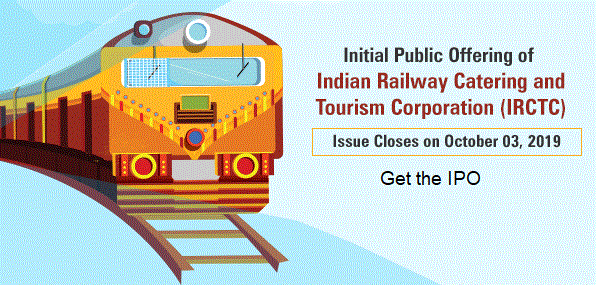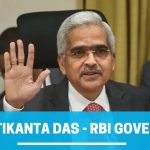IPO (Initial Public Offering) of the IRCTC will be opening today and open till Oct 03, 2019.
Indian Railway Catering and Tourism Corporation is issuing the IPO and planning to raise 645 crore rupees.
IPO of IRCTC Issue Details :
- Issue dates : September 30, 2019, to October 03, 2019
- Price band: 315 to 320 per share
- Lot Size: Minimum 40 shares and in multiples of 40 thereafter
- Issue Size: 630-640 Cr
A discount of 10 is being offered to the retail investors and eligible employees.
IRCTC (Indian Railway Catering and Tourism Corp Ltd) is the only entity authorized by Indian Railways to provide catering services to railways, online railway tickets and packaged drinking water at railway stations and trains in India.
The Company broadly operates through four business segments, namely, Internet ticketing (12.4% of top line), Catering (52.9%), Sale of products (11.1%), and Travel & tourism (23.5%).
What is reasons to invest in IPO of IRCTC?

E-booking in railway to grow at a CAGR of ~8-9% over FY19-FY24
IRCTC is the only entity authorized to provide rail e-booking facility, with other OTAs (Online Travel Agents) routing their rail e-booking transactions through IRCTC’s booking engine.
Going forward, it is expected that e-booking in railways will grow at a CAGR of ~8-9% to 42.5-43.5 crore.
Packaged Drinking Water has witnessed healthy growth of 19-20% over FY14-FY19E
The organized packaged drinking water market has been driven by the rising health consciousness of people. This market is expected to further grow by 16-17% CAGR and reach 180-185 billion in FY24E.
IRCTC is commissioning six new Rail Neer plants by 2020E and four new plants by 2021E. Sustained growth in domestic and inbound tourism coupled with preference for packaged drinking water over tap water is expected to be a major driver for bottled water demand in India.
IRCTC’s catering revenues to grow at a CAGR of 7.5-8.5% in next 5 years
IRCTC plans to expand its base kitchen network, with 15-20 Greenfield base kitchens to be set up along with the conversion of some Jan Aahar outlets on railway stations into base kitchens.
Growth in mobile catering services is likely to moderate to 7-8% going forward. Consequently, IRCTC’s catering revenues are expected to grow at 7.5-8.5% CAGR between FY19 and FY24 to reach 14.5-15.5 billion in FY24.
It’s a golden opportunity for stock market investors for long run. Because railways of India the key transportation system.
IPO of IRCTC Review
Indian Railway Catering and Tourism Corp.
Price Band | 315 – 320
IRCTC is the only entity authorized by Indian Railways to offer railway tickets online through its website www.irctc.co.in and mobile application, “Rail Connect”.
Approximately 72.60% of railways’ tickets are booked online with an average of more than 0.84 million tickets booked online on daily basis. According to CRISIL, online rail bookings are expected to grow at ~8% CAGR to reach ~425-435 million in FY24E, with e-booking penetration rising approximately 81–83% during the same period.
With a surge in e-commerce driven by increasing internet penetration in India, it eventually aids in creating leads for online businesses such as air tickets, hotels and tour package bookings, and opportunities to generate revenue by cross-selling services and products.
IRCTC is the only entity authorized to manage the catering services on board trains and major static units at railway stations under the Catering Policy 2017.
Company has continuously strived on improving the standard of catering services through various measures including third party audits. Additionally, with the mandate from the Ministry of Railways to transfer catering services in their entirety to IRCTC, has further expanded the company’s scale of operations. Company’s understanding of the market has enabled it to grow its business with improved passenger satisfaction.
Key risk and concerns
- Change in policy of Ministry of Railways could impact financials
- Competition could pose a risk to its monopoly position
- Stricter regulatory requirements for use of plastic
Priced attractively on forward basis
Inclusion of convenience fee on railway tickets, setting up of 10 water plants in next 2 years and recent tax reduction of corporate tax bodes well for EPS growth. Coupled with healthy dividend payout (45% in FY19) and RoE (26.1%), we recommend SUBSCRIBE to the issue at the offer price. Further, at the IPO price band of | 315-320, the stock is available at a price to earnings multiple of ~10x (FY21E EPS), which we believe looks attractive from the perspective of future earnings growth.
Key Financial Summary
Issue Details
| Issue Opens | 30-Sep-19 |
| Issue Closes | 3-Oct-19 |
| Issue Size (| Crore) | 635-645 |
| Price Band (|) | 315-320 |
| No of Shares on Offer (crore) | 2.0 |
| QIB (%) | 50 |
| Non-Institutional (%) | 15 |
| Retail (%) | 35 |
| Minimum lot size (No. of shares) | 40 |
| *|10 discount for employees customers | and retail |
| Shareholding Pattern (%) |
| Objects of the Issue to carry out the disinvestment of 2.0 crore equity shares by the selling shareholder constituting 12.6% of company’s paid up equity share capital b) to achieve the benefits of listing on the stock exchanges |
| crore | FY17 | FY18 | FY19 |
| Revenue from operations | 1535.4 | 1470.5 | 1867.9 |
| EBITDA | 312.6 | 273.1 | 372.2 |
| EBITDA Margin (%) | 20.4 | 18.6 | 19.9 |
| Reported PAT | 229.1 | 220.6 | 272.6 |
| EPS | 14.3 | 13.8 | 17.0 |
| RoCE (%) | 33.0 | 23.9 | 31.0 |
| RoE (%) | 29.1 | 23.1 | 26.1 |
| Source: ICICI Direct Research, RHP |
Company background
IRCTC is the only entity authorized by Indian Railways to provide catering services to railways, online railway tickets and packaged drinking water at railway stations and trains in India.
The company also provides non-railway catering and services such as e-catering, executive lounges and budget hotels. The company has been conferred with the status of Mini – Ratna (Category-I Public Sector Enterprise) by the Government of India, on May 1, 2008.
The company broadly operates through four business segments, namely, Internet ticketing (accounts for 12.4% of topline), Catering (52.9% of topline), Sale of products (11.1%), and Travel & tourism (23.5%).
Internet Ticketing
The company is the only entity authorized by Indian Railways to offer railway tickets online through its website and mobile application. As of August 31, 2019, more than 1.40 million passengers travelled on Indian Railways on a daily basis, which consisted of approximately 72.60% of Indian Railways’ tickets booked online.
As a result, there are more than 0.84 million tickets booked through www.irctc.co.in and “Rail Connect” on a daily basis. The company has transaction volume of more than 25 million per month and 7.2 million logins per day.
Catering
Under this segment,
the company provides
food catering services
to Indian Railway passengers on trains and at stations. On-board catering services are referred to as mobile catering
and catering services
at stations are referred
to as static catering. Pursuant
to the catering policy issued
by Ministry of
Railways dated February 27, 2017, the company provides catering services for approximately 350 pre-paid and post-paid trains and 530 static units.
The company provides catering services through mobile catering units, base kitchens, cell kitchens, refreshment rooms, food plazas, food courts, train side vending, and Jan Ahar over the Indian Railways network. The company also offers r e-catering services to passengers through its mobile application “Food on Track” and e catering website, www.ecatering.irctc.co.in.
Total income From Catering Services, Concession Fee, License Fee
Under this segment, the company manufactures and distributes packaged drinking water at all railway stations and on trains. The company has ten Rail Neer plants located at Nangloi, Danapur, Palur, Ambernath, Amethi, Parassala, Bilaspur, Hapur, Ahmedabad and Bhopal, with an installed production capacity of approximately 1.09 million litres per day, which caters to approximately 45% of the current demand of packaged drinking water at railway premises and in trains.
The company will further install 6 more plants in this year and 4 more plants have been approved by the Company’s Board of Directors and will be commissioned by 2021. This will increase the company’s presence in the packaged drinking water market at railway stations, and to meet the growing demand.
Travel and Tourism
The company has presence across major tourism segments such as hotel bookings, rail, land, cruise and air tour packages and air ticket bookings.
Industry Overview
E-booking in railway to grow at a CAGR of ~8-9% over FY19-FY24
Indian Railway Catering and Tourism Corporation (IRCTC) launched its rail e-booking services in 2002, which helped the rail booking segment gain significant ground in e-booking penetration.
IRCTC is the only entity authorized to provide rail e-booking facility, with other OTAs routing their rail e-booking transactions through IRCTC’s booking engine. Over FY14- FY19 the e-booking in railways has grown at a CAGR of 12.0% to 28.4 crore. The E-booking penetration has increased from 51.0% in FY14 to 70.0% in FY19.
Going forward, it is expected that e-booking in railways will grow at a CAGR of ~8-9% to 42.5-43.5 crore. The E-booking penetration is expected to increase from 70.0% in FY19 to ~81-83% in FY24E mainly led by rise in domestic tourism, widening rail network across the nation, increase in number of young travellers, and increased penetration in smaller cities and towns.
Further, improving internet penetration and access to smartphones, better awareness about online booking platform and improving technological infrastructure in IRCTC platforms will also boost demand for e-booking in coming years.
IRCTC’s catering revenues to grow at a CAGR of 7.5-8.5% in next 5 years
CRISIL Research has considered IRCTC revenues from catering business as rail catering industry size, since IRCTC is entirely responsible for catering
services provided to rail travellers through mobile catering and static catering. IRCTC plans to expand its base kitchen network, with 15-20 Greenfield base kitchens to be set up along with conversion of some Jan Ahar outlets on railway stations into base kitchens.
IRCTC also plans to add pantry cars to some trains not having pantry cars. Growth in mobile catering services is likely to moderate to 7-8% going forward as revenue is expected to normalize after handover of catering services per New Catering Policy 2017.
E-catering services, although still a small part of catering services, are expected to continue strong growth on the back of increasing restaurant listings, ease of on-seat food delivery and growing preference of travelers. While, revenue from static catering services is expected to grow at 13-14% due to moderation in addition of new food plazas/fast food units as coverage on railway stations nears saturation.
Consequently, IRCTC’s catering revenues is expected to grow at 7.5-8.5% CAGR between FY19 and FY24 to reach | 14.5-15.5 billion in FY24. The growth in IRCTC’s catering revenues is expected to be driven by:
- Likely increase in passenger traffic due to addition of new non- suburban trains i.e. long distance trains
- Rising affordability and variety of food items available in catering services
- Increasing coverage of catering services through addition of base kitchens and static catering units.
Packaged Drinking Water has witnessed healthy growth of 19-20% over FY14-FY19E
The organized packaged drinking water market has been driven by rising health consciousness of people due to concerns over the quality of tap water supply and the possible incidence of water-borne diseases due to consumption of contaminated water, resulting in opting for packaged drinking water as it proves as a safer alternative. Foreign tourists in India, especially from developed countries such as US and European nations, have preferred packaged drinking water from globally recognized brands due to concerns about quality of drinking water available while travelling in India. On the other hand, domestic tourists are also increasingly preferring packaged drinking water due to quality concerns about drinking water, convenience of disposal of water bottles, and improved availability of packaged drinking water. As a result, the organised packaged drinking water market has been estimated to have grown from | 30-35 billion (at retail price) in FY14 to | 80-85 billion in FY19E at a strong 19.5% CAGR. Going forward, the packaged drinking water is expected to grow at a CAGR of 16-17% to | 180-185 billion over FY19E-FY24E mainly led by higher demand from both the urban and rural areas, higher mobility among young population, changing lifestyle of people and rise in population.
Tourism Industry
Domestic travellers to witness significant uptick in next five years
Domestic Tourist Visits (DTVs) to all States/UTs in India have seen strong growth largely on account of rising disposable incomes, increase in connectivity via air and rail travel, affordability of air travel thanks to low-cost carriers, state-level policy initiatives for tourism and increasing room inventory across budget, mid-segment and premium hotels in the country.
In addition, increase in business travel, concept of weekend getaways and shorter stays gaining popularity, ease in bookings due to growing proliferation of online agents and aggregators and rising inclination of young travellers to explore untapped tourist destinations have also played a role in strong growth in DTV’s in India. Consequently, DTVs grew by 8.0-8.5% to reach 176.5-181.5 crore in 2018. Going forward, DTV’s are expected to grow at a CAGR of 9-10% Over CY18E-CY23E to 276.0-281.0 crore.
Foreign tourist arrivals to exhibit strong growth in next 5 years
Foreign tourist arrivals (FTAs) registered on-year growth of 5% to reach 1.0 crore in 2018, with FTAs on evisa continuing its strong growth at 39% on- year, reaching 0.24 crore in 2018 from 0.17 crore in 2017. Various luxury trains such as Maharaja Express and Golden Chariot offer an attractive route to explore the country for foreign tourists in India. These trains are aimed to provide tourists with an experience of the culture, heritage and cuisine of India by visiting various destinations in the country. Other than these luxury trains, foreign tourists are also attracted by other tour packages such as Bharat Darshan Tourist Train and Buddhist Circuit Special Train as they cover various destinations within the country at a relatively cheaper price. Hence, we expect significant improvement in revenues from luxury trains and state run trains over the coming years.
Investment Rationale
IRCTC is the only entity authorized by Indian Railways to offer railway tickets online through its website www.irctc.co.in and mobile application, “Rail Connect”.
Approximately 72.60% of Indian Railways’ tickets are booked online with an average of more than 0.84 million tickets booked through www.irctc.co.in and “Rail Connect” on a daily basis. Online rail bookings have registered ~12.5% CAGR to reach ~284 million annually during FY14-
19. According to CRISIL, online rail bookings are expected to grow at approximately 8% CAGR to reach approximately 425-435 million in FY24E, with e-booking penetration rising approximately 81 – 83% during the same period.
With a surge in e-commerce driven by increasing internet penetration in India, it eventually aids in creating leads for online businesses such as air tickets, hotels and tour package bookings, and opportunities to generate revenue by cross-selling services and products.
As a CPSE under the Ministry of Railways, IRCTC is the only entity authorized to manage the catering services on board trains and major static units at railway stations under the Catering Policy 2017.
Since its start of operations in 1999, company has continuously strived on improving the standard of catering services through various measures including third party audits.
Additionally, with the mandate from the Ministry of Railways to transfer catering services in their entirety to IRCTC, company is now responsible for catering services in all mobile catering units (trains) and static units (except refreshment rooms at stations which are of Category B or below and other minor units operated by Indian Railways) further expanding the company’s scale of operations.
Company’s understanding of the market has enabled it to grow its business with improved passenger satisfaction.
Authorised entity to manufacture and distribute packaged drinking water
IRCTC is exclusively authorized by the Ministry of Railways to manufacture and distribute packaged drinking water at all railway stations and trains, subject to availability of Rail Neer.
The total average daily demand for packaged drinking water in India at all railway stations and in trains is approximately 1.8 million litres per day, and company is able to cater to approximately 45% of the total demand based on the existing production capacities at ten Rail Neer plants.
Currently, company operate ten Rail Neer plants with an installed capacity of approximately 1.09 million litres per day, which caters to approximately 45% of the current demand of packaged drinking water at railway premises and in trains.
To increase its presence and meet the remaining and future requirements of the packaged drinking water at station premises and trains, IRCTC is commissioning six new Rail Neer plants by 2020E and four new plants by 2021E. As of FY19, the share of organised segment in the packaged drinking water market is 60-65% whereas the share of unorganised segment in the market is 35-40%.
Sustained growth in domestic and inbound tourism coupled with preference for packaged drinking water over tap water is expected to be a major driver for bottled water demand in India. The packaged drinking water market is expected to further grow by 16-17% CAGR and reach ₹ 180-185 billion in FY24E. Current mismatch in supply and demand presents a significant opportunity to grow its business operation by making Rail Neer more accessible to general public at railway stations and on trains.
Strategies
Diversification and new service offerings
Company strives to strengthen and enhance the services provided by Indian Railways, and tap opportunity presented by digital payments in the Indian economy which is growing at significant pace.
IRCTC transact payments of more than ₹ 360 billion annually through banks and payment aggregators. To capitalize on this opportunity both in-house and beyond, company has implemented its own payment gateway platform named IRCTC e-Wallet, and are also developing additional payment tools to facilitate easy and efficient payment by its customers.
Additionally, company is trying hands on developing prepaid cards and acting as private train operator initially on pilot project basis.
Leveraging government policy to expand business
Since the implementation of Catering Policy 2017, company has worked to improve the catering services offered on trains and in stations, including upgrading of base kitchens.
Government policy to unbundle the production and distribution of catering service provides a good opportunity to further grow business, with an opportunity to offer more services ourselves or through its licensees.
Company is planning to serve more than 1,500 non- pantry car trains through train side vending (“TSV”). Further, IRCTC is currently planning to roll out at least ten new pantry cars in FY20E once the design is approved by Indian Railways.
Company will continue to make investments to improve the quality of services by unbundling food preparation and food distribution, and setting up new base kitchens and upgrading the existing ones.
In packaged drinking water segment, it operates ten Rail Neer plants with an installed capacity of approximately 1.09 million liters per day, which caters to approximately 45% of the current demand of packaged drinking water at railway premises and in trains.
To increase its presence and meet the remaining and future requirements of the packaged drinking water at station premises and trains, IRCTC is commissioning six new Rail Neer plants by 2020E and four new plants by 2021E.
Key risks and concerns
Adverse change in policy of Ministry of Railways could impact financials
IRCTC business and revenues are substantially dependent on the policies of the Ministry of Railways and operations of Indian Railways. As a CPSE wholly owned by the Government of India and under the administrative control of the Ministry of Railways, its scope of services, and the fees IRCTC charge, are primarily determined by the Ministry of Railways.
At certain times in the past, the Government has made certain decisions that has adversely impacted company’s results of operations. For example, the Ministry of Railways in 2016 removed the charges IRCTC levy on passengers booking railway tickets online as service charge at rates of ₹ 20 per ticket for non AC classes and ₹ 40 per ticket for AC classes.
This had a material adverse impact on its revenues. Though the Ministry of Railways reimbursed the company in the amount of ₹ 80 crore and ₹ 88 crore for FY18 and FY19, respectively for its operations costs on the back of the online ticketing service that IRCTC provides.
Any similar decisions by the Ministry of Railways in the future could adversely affect company’s results of operations.
Competition could pose a risk to its monopoly position
Under the Catering Policy 2017, IRCTC benefits from a monopoly position in many of the services with the company being exclusive provider of online railway ticketing, catering services and packaged drinking water for trains and stations. Company generated 25.62%, 48.70% and 54.99% of revenue from railway catering in FY17, FY18 and FY19, respectively, and 10.22%, 11.13% and 9.28% of revenue from packaged drinking water in FY17, FY18 and FY19, respectively.
If the Ministry of Railways were to permit more competition in mobile or static catering, packaged drinking water or another area in which company currently have a monopoly position, it could impact its results of operations and profitability.
Adverse ruling in outstanding litigation may impact adversely
Adverse ruling on outstanding proceedings at different levels of adjudication before various courts, tribunals and appellate authorities could have a material impact on IRCTC performance.
Proceedings against company
| 1 Criminal | 8 | 0.0 |
| 2 Tax | 95 | 225.7 |
| 3 Other pending material litigation | 23 | 397.6 |
| Proceeding by company | ||
| 1 Criminal | Nil | Nil |
| 2 Other pending material litigation | 1 | Nil |
| Proceedings against certain Directors | ||
| 1 Criminal | 1 | 0.0 |
| 2 Tax | Nil | Nil |
| 3 Other pending material litigation | Nil | Nil |
| Proceedings by company’s Directors | ||
| 1 Criminal | Nil | Nil |
| 2 Other pending material litigation | Nil | Nil |
Stricter regulatory requirements for use of plastic could impact its business
The principal packaging materials used by IRCTC for packaged drinking water include preforms for PET bottles, shrink-wrap films, plastic closures and labels. Governmental bodies have introduced policies to discourage the use of plastic products.
The Ministry of Railways, Government of India vide its letter dated August 19, 2019 have directed the company to implement return of plastic drinking water bottles as part of an effort to increase responsibility on the part of companies that produce such bottles.
Also, Maharashtra Pollution Control Board directed its West Zone to create a separate fund for discharging its liability by crediting an amount of 15 paisa per bottle introduced or sold by the company directly or through its distributor/wholesalers/retailers or partners. Any inability on the company’s part to implement the directives may materially and adversely affect its Rail Neer business.
In addition, in case stricter environmental protection policies are enacted or market trends emerge to phase out the use of plastics, particularly in relation to plastic bottles, company’s business and financial performances could be adversely affected.
Financial Summary
| Exhibit 13: Profit & Loss Statement | |||
| (| Crore) | FY17 | FY18 | FY19 |
| Revenue from operations | 1,535.4 | 1,470.5 | 1,867.9 |
| Employee benefits expense | 163.8 | 192.2 | 195.1 |
| Cost of material consumed | 95.9 | 94.8 | 93.3 |
| Expenses of Catering services | 78.1 | 246.3 | 639.1 |
| Expenses of Tourism | 415.6 | 305.2 | 309.0 |
| Manufacturing & direct expenses | 237.8 | 67.1 | 61.3 |
| Other expenses | 231.6 | 291.8 | 198.0 |
| Total Operating Expenditure | 1,222.8 | 1,197.4 | 1,495.7 |
| EBITDA | 312.6 | 273.1 | 372.2 |
| Finance Cost | 2.5 | 2.9 | 2.3 |
| Depreciation & Ammortization | 22.4 | 23.7 | 28.6 |
| Other Income | 67.5 | 99.1 | 88.8 |
| PBT | 355.1 | 345.6 | 430.0 |
| Tax | 126.0 | 125.0 | 157.4 |
| Reported PAT | 229.1 | 220.6 | 272.6 |
| EPS | 14.32 | 13.79 | 17.04 |
| Exhibit 14: Balance Sheet | |||
| (| Crore) | FY17 | FY18 | FY19 |
| Equity Capital | 40.0 | 40.0 | 160.0 |
| Reserve and Surplus | 746.6 | 914.5 | 882.8 |
| Total Shareholders funds | 786.6 | 954.5 | 1,042.8 |
| Total Debt | – | – | – |
| Other long term liabilities | 14.2 | 31.2 | 20.5 |
| Long term provisions | 78.0 | 58.5 | 46.2 |
| Total Liabilities | 878.7 | 1,044.2 | 1,109.5 |
| Fixed Assets Tangible + CWIP | 174.6 | 163.3 | 187.4 |
| Intangible | 12.6 | 6.6 | 7.5 |
| Non current investments | 0.0 | 27.6 | 27.7 |
| Deffered Tax assets | 57.5 | 46.4 | 77.1 |
| Other non current assets | 15.0 | 15.1 | 25.3 |
| Total Non Current Assets | 259.8 | 258.9 | 325.1 |
| Inventories | 6.6 | 7.4 | 7.9 |
| Trade receivables | 289.4 | 550.9 | 581.7 |
| Cash and Bank balances | 853.0 | 833.9 | 1,140.0 |
| Other current assets | 417.7 | 668.0 | 529.1 |
| Total Current Assets | 1,566.7 | 2,060.2 | 2,258.7 |
| Trade Payables | 137.6 | 150.8 | 192.0 |
| Other current liabilities | 808.9 | 1,120.8 | 1,268.5 |
| Short term provisions | 1.2 | 3.3 | 13.8 |
| Total Current Liabilities | 947.7 | 1,274.9 | 1,474.2 |
| Net Current Assets | 619.0 | 785.3 | 784.5 |
| Total Assets | 878.7 | 1,044.2 | 1,109.5 |
Recommendation in reports based on technical and derivative analysis centre on studying charts of a stock’s price movement, outstanding positions, trading volume etc as opposed to focusing on a company’s fundamentals and, as such, may not match with the recommendation in fundamental reports. Investors may visit icicidirect.com to view the Fundamental and Technical Research Reports.
Our proprietary trading and investment businesses may make investment decisions that are inconsistent with the recommendations expressed herein.
Disclosure
This report is not directed or intended for distribution to, or use by, any person or entity who is a citizen or resident of or located in any locality, state, country or other jurisdiction, where such distribution, publication, availability or use would be contrary to law, regulation or which would subject ICICI Securities and affiliates to any registration or licensing requirement within such jurisdiction. The securities described herein may or may not be eligible for sale in all jurisdictions or to certain category of investors.
Persons in whose possession this document may come are required to inform themselves of and to observe such restriction.
Download the IRCTC IPO PDF File Free
We are here with complete IRCTC IPO PDF file for you to download for free. Get the IPO of IRCTC PDF here.






